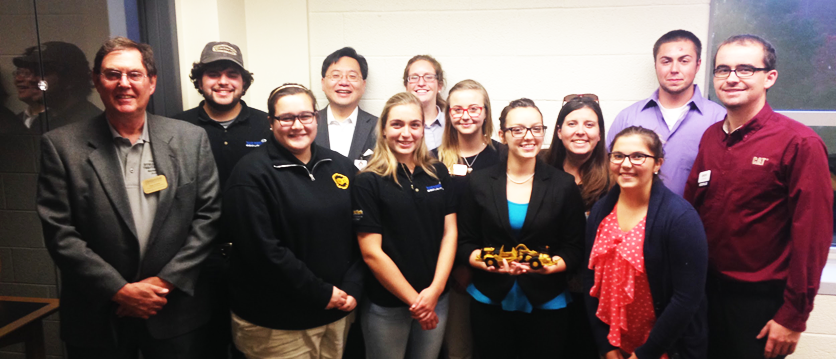Michigan Tech’s engineering students received a standing ovation for grabbing the first position in the Society of Women Engineers Team Tech Boeing Competition in Philadelphia, Pennsylvania. This happened at the 2016 conference of SWE. Michigan Tech’s award-winning team consisted of two student groups – Blue Marble Security of the department of electrical and computer engineering, and Consumer Product Manufacturing of the department of chemical engineering. Both student groups formed one team with Caterpillar Inc. as their industrial partner. The competition required universities to team up with an industrial partner and design a product based on the company’s specifications.
The team’s winning project was the “Wheel Tractor-Scraper Bowl Optimization” project. The project tries to produce a device for under $1000 that can be attached to a Wheel Tractor-Scraper to increase efficiency. The team’s goals were to “increase operator efficiency, detect a stalled bowl when dirt gets stuck and the bowl no longer fills, detect an overflowing bowl when maximum capacity of the bowl has been reached, and alert the operator and prompt action” according to Sandra Cvetanović, a third year student and team member. The team then set out to execute their goals through four semesters of experimentation. This culminated in the design and prototype production of the bowl optimization device.
The device consists of three parts, the processing unit, operator interface, and a sensing system. The processing unit is easy to integrate onto the WTS, and additionally has a camera mounted onto it. An ultrasonic sensing system is used to acquire data alongside the video feedback from the camera. The information is then sent to the operator interface. When choosing the design, the team had to pay special attention to cost and industrial viability as the WTS operates in a very rough and noisy environment. Due to the several delicate components that could not be swapped for their industrial counterparts due to cost limitations, the team was also faced with the challenge of designing and developing a protective casing for both the processing unit and operator interface.
“In order to test the design, the team had to build their prototype and test it. This was carried out over two semesters, including a summer semester,” said Cvetanović. “The testing process had to be specially designed for the prototype as the team had no access to a physical WTS. This led to a long and strenuous process of building a ‘bowl profile’ to mimic the various scenarios of bowl filling,” she continued. According to Cvetanović, the team manually graphed the data to assess the accuracy and efficiency of the design solution. The team made several adjustments during the process of testing in order to improve the design, including sensor selection and camera.
Throughout the duration of the project, there was documentation of everystep. As a requirement, the team submitted a lot of progress reports to SWE. Several presentations were also done for CAT stakeholders and faculty members in preparation for the competition.
Cvetanović told the Lode that the team will continue work with Caterpillar to finish their product and also work towards a new project for the 2017 competition in Austin, Texas. She said the team is “happy because we put lots of our efforts into this work. Our sponsors are also very happy. Our advisors have been impressed, and we all are motivated as future engineers.”
According to the competition organizers, each eligible team must have a membership of four to twelve students, have more than fifty percent of the team be active SWE members, and be comprised of at least three different engineering disciplines. Also, each team must be made up of undergraduate students with a maximum of 1 graduate student. Only undergraduate students made up the Michigan Tech team. The members were Ester Buhl (electrical engineering) the team leader, Brianne Anderson (mechanical engineering), Derek Chopp (electrical and computer engineering), Sandra Cvetanović (electrical engineering), Alexis Dani (computer engineering), Jennifer Dzurka (mechanical engineering), Anna Marchesano (chemical engineering), and Jonathan Quinn (mechanical engineering) with Drs. Archer and Rogers as advisors. For their award, the team received $5,000. Each team member will receive $400 from this amount, and the remaining


